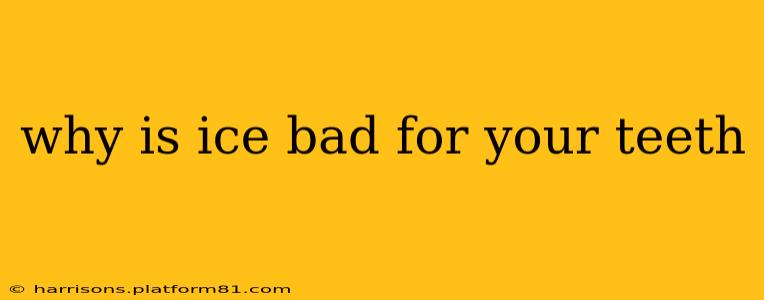Chewing ice might seem harmless, even refreshing, but the reality is that this seemingly innocuous habit can significantly damage your teeth. While the occasional accidental chip isn't a major concern, regularly crunching on ice cubes puts your dental health at serious risk. Let's explore why.
How Does Chewing Ice Damage Teeth?
The primary reason ice is detrimental to your teeth is its extreme hardness. Your enamel, the protective outer layer of your teeth, is the hardest substance in the human body, but it's not invincible. Chewing ice subjects your enamel to significant forces, leading to:
-
Cracks and Chips: The most immediate and visible damage is the fracturing of enamel. These cracks can be microscopic, initially causing no pain, but they create pathways for bacteria and decay to enter the tooth. Larger chips are more obvious and can expose the sensitive dentin underneath, causing pain and potentially requiring fillings or crowns.
-
Fractured Teeth: In severe cases, the force of chewing ice can actually fracture a tooth, requiring extensive and costly dental work to repair or even extract the damaged tooth.
-
Increased Sensitivity: Even without visible cracks, repeated ice chewing can weaken the enamel, leading to increased sensitivity to hot and cold temperatures, sweet foods, and even air.
-
Worn-Down Enamel: Over time, the constant abrasive action of chewing ice wears down the enamel, making teeth more vulnerable to cavities and other dental problems. This is especially problematic because enamel doesn't regenerate.
What Are the Long-Term Effects of Chewing Ice?
The consequences of regularly chewing ice extend beyond immediate damage. The cumulative effect of repeated micro-fractures and enamel erosion can significantly increase your risk of:
-
Cavities: Damaged enamel provides easy access for bacteria to reach the inner layers of your teeth, leading to decay and cavities.
-
Gum Disease: Cracked teeth can also irritate the gums, increasing the risk of gum disease (gingivitis and periodontitis).
-
Tooth Loss: In severe cases, extensive damage from ice chewing can eventually lead to tooth loss.
Is it only ice that damages teeth?
While ice is particularly damaging due to its hardness, other hard substances like nutshells and hard candies can also cause similar problems. The key is to avoid repeatedly chewing exceptionally hard foods.
How Can I Protect My Teeth from Ice Damage?
The simplest solution is to avoid chewing ice entirely. If you enjoy the refreshing sensation of cold, try substituting ice for other cooling options, such as:
- Cold water: A simple and healthy alternative.
- Frozen fruit: A delicious and nutritious option that satisfies your craving for something cold.
- Ice chips in your drinks: Enjoy the coldness without the risk of chewing.
Why is chewing ice a bad habit?
Chewing ice is a bad habit because of the cumulative damage it inflicts on your teeth over time. While a single instance might not cause harm, the repeated stress on your enamel ultimately leads to cracks, chips, sensitivity, and a greater susceptibility to cavities and other dental problems. It's a habit best avoided for long-term dental health.
Can chewing ice cause other problems besides tooth damage?
While tooth damage is the most significant concern, some people might experience temporomandibular joint (TMJ) disorders due to the strain placed on the jaw from forcefully chewing ice.
By understanding the risks and adopting safer alternatives, you can protect your teeth from the damaging effects of ice and maintain a healthy, beautiful smile for years to come. Remember, prevention is always better than cure when it comes to your dental health.
